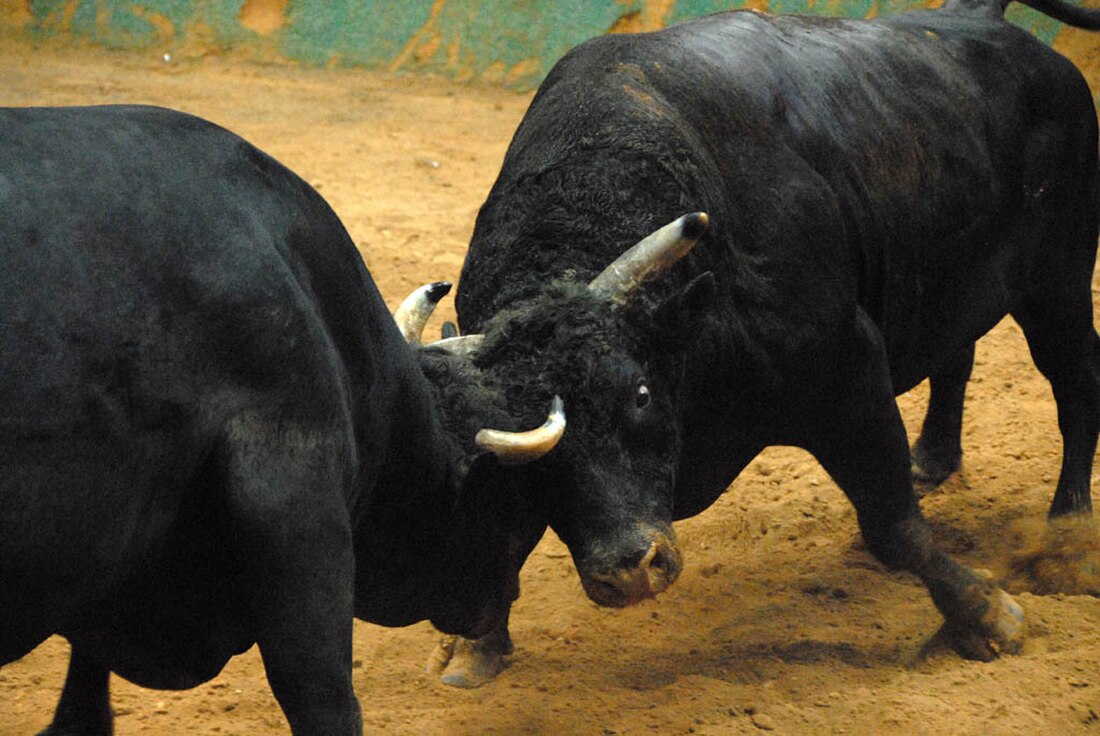Bull wrestling
Non-lethal bloodsport between cattle From Wikipedia, the free encyclopedia
Bull wrestling, cow fighting or bull fighting is a non-lethal human-facilitated bloodsport between bulls or cows found in some parts of the world.

Africa
The Luhya community in Kenya practices a bull-on-bull sport.[1] Savika is a bull-wrestling sport practiced in Madagascar's central highlands.
Europe
Summarize
Perspective
Korida, from corrida, or borbe bikova ("fights of bulls") is a traditional sport in Bosnia and Herzegovina and Croatia.
Bosnia and Herzegovina

In Bosnia and Herzegovina, the fights are most popular in Bosanska Krajina, where the famous Corrida of Grmeč (Grmečka korida) is held. Grmeč, a mountain in the extreme west of Bosnia, is the best-known site of Korida of Grmeč bullfights in the Balkans. These are fights between bulls themselves and there is no death of a bull.[2] The fight is won when the losing bull turns his back and flee from the fight.[3][4] Fights happen in an empty field,[5] and have been organised on every first Sunday in August for over 200 years, attracting thousands of visitors. The fights were brought about to Western Balkans, mostly Bosnia and bordering Dalmatian Hinterland in Croatia, by the Ottomans from Turkey, where they are popular for hundreds of years.[2]
The korida of Grmeč was depicted by the sculptor Slobodan Pejić. The sculpture of two bulls in a fight, made in bronze in 2004, has been compared to a confrontation of the oppressor and the oppressed or of the Bosnian people and the Austrian Emperor.[6]
Similar fights are organized in several places around Bosnia and Herzegovina, such Sanski Most, Cazin, Velika Kladuša, all in Bosanska Krajina, but also in central and eastern parts of the country, such as Vitez and Olovo's nearby villages Čevljanovići and Boganovići.[7][8][2][4]
Croatia
In Croatia, koridas are traditionally organized in Dalmatian Hinterland region.[9]
East and Southeast Asia
- Tōgyū, known by some as "Okinawan bullfighting", is the traditional sport, in which two bulls attempt, as in sumo wrestling, to push one another out of a ring.[10] It is still practised in the various places in Japan, such as Niigata, Okinawa and Shimane Prefectures.
- Sossaum (Korean: 소싸움) is a traditional sport of Korea, in which two oxen are pitted against each other.[11]
- Bullfighting is also observed by the ethnic Hmong/Miao minority in China, Vietnam and Laos. Bulls are selected by age, horn length and size. They are enticed to fight usually after new year's or summer events. They are usually non-lethal events and bulls that carry the opposing bulls will get the most points if it is a draw. The loser is usually the bull that flees first even if winning.
South Asia
Summarize
Perspective

India
Dhiri or Dhirio (Konkani: धिरी,धिरयो) is a popular form of traditional bull wrestling in the state of Goa, Coastal South West India. It was the weekend entertainment staple for most villages. Many families lived off the earnings made on appearance money and bets alone.[12] The Panaji Bench of the high Court vide order dated 20.12.96 directed the State Government to take immediate steps to ban all types of animal fights including Dhiri organised in the State of Goa, which was finally banned in 1997.[13] Dhiri bullfights are still very popular in Goa despite the ban. There have been demands for legalizing Dhiri.[14]
Nepal


Every year on the day of Maghe Sankranti in different districts of Nepal bull wrestling is organized. The most oldest and popular bull wrestling of Nepal is of Taruka, Nuwakot, 75 kilometres (47 mi) away from Kathmandu. It is believed to have started in the early years of the 18th century as source of entertainment for nobles while visiting the village. Many people from around the country visit Taruka to witness this event. Other than Nuwakot bull wrestling is also organized in Dhading and Rasuwa.
Western Asia
Summarize
Perspective
Iran
VarzaJang is a bloodsport organized between bulls in the north of Iran. This wrestling is organized only in Gilan and Mazandaran provinces.VarzaJang takes place mainly in Mazandaran in Amol, Noor, Chamestan and Nowshahr and in Gilan in Rudsar, Lahijan, Chaboksar, Rasht and Khomam.[15]
Oman and the United Arab Emirates

In Oman and the United Arab Emirates two Brahman bulls are presented to each other and allowed to lock horns and fight, while their handlers hold ropes to separate them if necessary.[16][17] The origins of bullfighting in Oman are unknown, though locals believe it was brought here by the Moors who had conquered Spain. Its existence in Oman and the UAE is also attributed to Portugal, which colonized the Omani coastline for nearly two centuries,[18][19] and also introduced bullfighting to Omani Zanzibar.[20]
Turkey
Bull wrestling in Turkey is known as boğa güreşi (literally "bull wrestling"). Each year in the third week of June, the Kafkasör (Caucasus) festival takes place in the city of Artvin. At the beginning of the festival, certain rules are applied in order to save the bulls from injury. For example, if a bull retreats from the fight, it means defeat, etc.[21]
Islamic law
On 17 October 1987, the Muslim World League issued a fatwa declaring bullfighting and animal pits to be forbidden under Islamic law.[22]
See also
- Bull-baiting
- Bullfighting
- Camel wrestling
- Alligator wrestling
- Cockfight
- Combat de Reines, cow wrestling in Switzerland
- Dog fighting
- Horn fighting, the way horned ungulates fight
References
External links
Wikiwand - on
Seamless Wikipedia browsing. On steroids.
